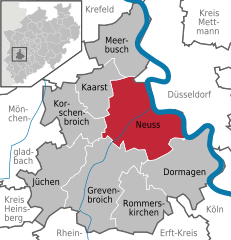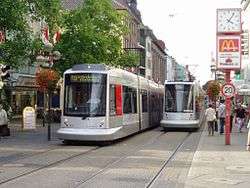Neuss
| Neuss | ||
|---|---|---|
|
Town hall | ||
| ||
 Neuss | ||
Location of Neuss within Rhein-Kreis Neuss district 
 | ||
| Coordinates: 51°12′N 6°42′E / 51.200°N 6.700°ECoordinates: 51°12′N 6°42′E / 51.200°N 6.700°E | ||
| Country | Germany | |
| State | North Rhine-Westphalia | |
| Admin. region | Düsseldorf | |
| District | Rhein-Kreis Neuss | |
| Government | ||
| • Mayor | Herbert Napp (CDU) | |
| Area | ||
| • Total | 99.48 km2 (38.41 sq mi) | |
| Population (2014-12-31)[1] | ||
| • Total | 152,644 | |
| • Density | 1,500/km2 (4,000/sq mi) | |
| Time zone | CET/CEST (UTC+1/+2) | |
| Postal codes | 41460-41472 | |
| Dialling codes | 02131, 02137 (Norf), 02182 | |
| Vehicle registration | NE | |
| Website | www.neuss.de | |
Neuss (German pronunciation: [ˈnɔʏs]; spelled Neuß until 1968; Limburgish: Nüss; Latin: Novaesium) is a city in North Rhine-Westphalia, Germany. It is located on the west bank of the Rhine opposing Düsseldorf. Neuss is the largest city within the Rhein-Kreis Neuss district. It is primarily known for its historic Roman sites, as well as the annual Neusser Bürger-Schützenfest. In 1984 Neuss celebrated 2000 years since its foundation. It therefore holds the title of "Germany's oldest city" alongside the city of Trier.
History

Ancient Rome
Neuss was founded by the Romans in 16 BC as a military fortification (castrum) with the current city to the north of the castrum, at the confluence of the rivers Rhine and Erft, with the name of Novaesium. Later a civil settlement was founded in the area of today's center of the town during the 1st century AD. Novaesium, together with Trier (Augusta Treverorum), is one of the three oldest Roman settlements in Germany.
Middle Ages
Neuss grew during the Middle Ages because of its prime location on several routes, by the crossing of the great Rhine valley, and with its harbour and ferry. During the 10th century, the remains of the martyr and tribune Saint Quirinus, not to be confused with the Roman god Quirinus, had been relocated to Neuss. This resulted in pilgrimage to the shrine of St. Quirinus even from countries beyond the borders of the Holy Roman Empire. Neuss was first documented as a town in 1138.
One of the main events in the town's history is the siege of the town in 1474–75 by Charles the Bold, Duke of Burgundy, that lasted for nearly a year. The citizens of Neuss withstood the siege and were therefore rewarded by the Holy Roman Emperor Frederick III. The town was granted the right to mint its own coins and to carry the imperial coat of arms, the imperial eagle and the crown, in the town's own coat of arms. Neuss became a member of the Hanseatic League, although it was never accepted by the other members of the League.
Early Modernity
In 1586, more than two-thirds of the city was destroyed by fire, and several wars during the reign of King Louis XIV of France resulted in worsening finances for Neuss. Its importance as a place for trading declined rapidly, and from the mid-17th century onwards, Neuss became a place only important for its agriculture.
Until the late 18th century, Neuss belonged to the Electorate of Cologne. From 1794 to 1814, Neuss was part of France during the reign of Napoleon. In 1815 after the Napoleonic Wars, Neuss became part of the Kingdom of Prussia, and was reorganized as a district with the municipalities of Neuss, Dormagen, Nettesheim, Nievenheim, Rommerskirchen and Zons. The town had a population of 6,333 at that time. It was part of the Prussian Province of Jülich-Cleves-Berg (1815–22) and its successor, the Rhine Province (1822–1946).
19th century - present
Neuss regained its economic power in the 19th century, with expansion of the harbour in 1835, and increasing industrial activity. The city's boundaries were expanded in 1881. Neuss became part of the new state of North Rhine-Westphalia in 1946.
In 1968 the spelling of the name was changed from Neuß to Neuss. In 1975 the town of Neuss and the district of Grevenbroich were joined to form the district of Rhein-Kreis Neuss with a population of 440,000 and its seat of government in Neuss. Neuss is also home to Toshiba's European headquarters.
| Largest groups of foreign residents[2] | |
| Nationality | Population (2013) |
|---|---|
| 5,864 | |
| 1,429 | |
| 1,218 | |
| 1,125 | |
| 1,016 | |
| 909 | |
Sports
One sports club is Neusser Schlittschuh-Klub. Their sections are figure skating, ice stock sport and, as the only club in Germany, bandy. With the lack of a large ice surface, the variety rink bandy is practiced.[3] And there is also a football club in the city of Neuss, the VfR Neuss Football Club. There is also a fieldhockey club, HTC Schwarz-Weiss Neuss, and TC Blau-Weiss Neuss, a famous tennis club where Nadal began his career. And an American Football Club, the Neuss Frogs. Besides Neuss owns an all-weather racecourse called "Galopprennbahn Neuss".
Points of interest
- Botanischer Garten der Stadt Neuss, the city's botanical garden
- Saint Quirinus Minster: a 13th-century late romanesque church, dedicated to the city's patron saint and housing a shrine with his relics. Its dome-shaped eastern tower is one of the city's landmarks. In 2009 it was granted the title of minor basilica.
- Obertor (Upper Gate): southern city gate, built c.1200; today part of the Clemens-Sels-Museum. It is the only remaining of originally six gates that were part of the medieval town fortification.
- Blutturm (Bloody Tower): built in the 13th century, the only remaining round tower of the historic town fortification.
- Zum "Schwatte Päd" (The Black Horse): the oldest public house in the Lower Rhine region, established 1604
- Saint Sebastianus Church
- Saint Maria Church:
- Christuskirche (Christ church): historicistic church, the city's oldest Protestant church
- Globe Theater, a replica of the London Globe Theatre, with an annual Shakespeare festival
- Hamtor/the Hamgate
- Neusser Bürger-Schützenfest: one of Germany's largest marksmen's festivals, taking place annually on the last weekend in August; roundabout 7000 marksmen take part in the traditional parades.
Gallery
-

Saint Quirinus Minster
-
Obertor
-

St. Sebastianus Church
-
Christuskirche
-

Blutturm
Twinnings
-
 Châlons-en-Champagne, France, since 1972
Châlons-en-Champagne, France, since 1972 -
 Pskow, Russia, since 1990
Pskow, Russia, since 1990 -
 Rijeka, Croatia, since 1990
Rijeka, Croatia, since 1990 -
 Saint Paul, Minnesota, United States, since 1999
Saint Paul, Minnesota, United States, since 1999 -
 Nevşehir, Turkey, since 2007
Nevşehir, Turkey, since 2007 -
 Bolu, Turkey
Bolu, Turkey
References
- ↑ "Amtliche Bevölkerungszahlen". Landesbetrieb Information und Technik NRW (in German). 23 September 2015.
- ↑ "Die ausländischen Mitbürger in der Stadt Neuss am 0 1.01.2013" (PDF). Stadt Neuss. Retrieved 2014-10-26.
- ↑ Neusser Schlittschuh-Klub official home page
External links
| Wikimedia Commons has media related to Neuss. |
- Official website (German) (English)
| ||||||||
|
